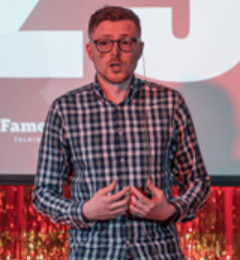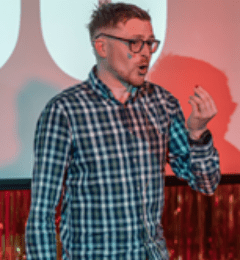How FameLab at the NI Science Festival supported my personal development
By Gareth Burns, Senior Data Scientist at Exploristics
Scientific communication has never been more important. As a society we face many unprecedented challenges such as climate change, global pandemics, biodiversity loss and feeding a growing population amongst others. Science is also giving us many new tools to tackle these global issues including artificial intelligence (AI) machine learning, and gene editing.
Why do we need effective science communication?
The issues surrounding the application of these new tools require a nuanced public debate as they often transcend scientific issues, entering areas of ethics, politics, and philosophy.
As Ian Malcom, the gifted mathematician played by Geoff Goldblum in the film Jurassic Park said:
“Your scientists were so preoccupied with whether or not they could, they didn’t stop to think if they should.”
Therefore, effective science communication is vital as it serves as a bridge between the complex and highly specialised realms of scientific research and public stakeholders. For example, it can help ensure that our politicians who do not often have a scientific background are making informed decisions that consider multiple influential factors. The importance of this was evident during the COVID-19 pandemic when issues of public health, mental health and the economy often clashed. Effective science communication also ensures that the wider public who vote for politicians understand the implications of the decisions they take and how people could be affected by them.
Communication within STEM
My career in science spans several decades now. I have worked in diverse areas ranging from fisheries stock assessment to emotive ones like how wildlife reserves contribute to bovine tuberculosis, a devasting disease that has wrecked the livelihoods of many farmers. In my personal experience, I have found great communicators within science. However, the complex and technical nature of the ideas and methods involved in scientific research mean that it can be difficult to share these directly a wider audience. While there are already some fantastic and noted communicators of science in the media such as David Attenborough, Brian Cox, Jim Al Khalili, and Hannah Fry to name a few, the growing impact of science on every aspect of our lives mean that there is always room for more.
Developing new talent
Events like the Northern Ireland Science Festival and Famelab provide an excellent opportunity to develop new talent and highlight the importance of effective science communication. The Northern Ireland Science Festival is an annual event that celebrates science, technology, engineering, and mathematics (STEM) across Northern Ireland. The national FameLab competition invites STEM professionals to engage and entertain a non-expert audience by communicating scientific concepts effectively in just three minutes. The aim of these talks are to be fun, exciting, informative and most importantly accessible.
My FameLab experience
I have always been interested in science communication and mentoring, so I applied to the FameLab competition this year. It was a little daunting to take the plunge, but they say a journey of a thousand miles begins with a single step and the first step is often the hardest. Despite my initial apprehension, I was delighted to get through to the live regional final for Northern Ireland in February.
The regional final involved ten competitors, all passionate about their area of science. While I was happy to have progressed so far in the competition, I was also riddled with anxiety and just a little impostor syndrome. Everyone seemed so experienced in television or radio already. Did I really belong here after all?



Competing in the Northern Ireland regional final of FameLab at the Northern Ireland Science Festival. Photos by Neil Harrison for NI Science Festival.
The power of talking to strangers
My experience can be summed up by a talk of one of the other participants, Eoghan from Extern. He talked about his experiences working with vulnerable people in the post troubles and post pandemic era and how talking to strangers improves mental health. However, talking to strangers is the high up the list of things I often actively avoid doing, so why would I want to do that!? Yet I knew that by giving into my fears of speaking, I would lose out on a myriad of opportunities; opportunities for novel experiences, opportunities to meet new people as well as opportunities to learn new skills. Eoghan’s talk touched on how going into uncomfortable situations triggers serotonin production creating a natural high and can act as a type of exposure therapy. So, I braved my fears and delivered my talk on, “Successful Simulations: Saving Lives with Computer Computation”. I was so glad that I did.
Personal development
I did not win my final, but I was proud to have overcome my inhibitions to present alongside a strong field of fantastic science communicators. Moreover, FameLab provided me with valuable training and networking opportunities, and helped me hone my communication skills, build confidence, and gain exposure to broader audiences. The event challenged me to expand my communication skillset to distil complex scientific ideas into engaging narratives. It encouraged me to draw on a variety of storytelling techniques, using props and demonstrations to make my presentation both memorable and accessible.
Although I was a little disappointed with my performance on the night, I’d overcome my fears, acted as a role model, networked with the Northern Irish scientific community, and had a great time. Who’d of thought that speaking to strangers could have such a positive effect!
A first step
All 10 FameLab participants are now on their own science communication journey. We’ll all follow different paths. Some of us might be the next David Attenborough informing and entertaining millions in the media. Others might get to sit on government committees influencing policy decisions that affect peoples’ lives every day. Yet more may be the tomorrow’s educators and enjoy the immense privilege of inspiring the next generation of scientists. All of this is possible because we took the first step and applied to FameLab.
Read more:
Discover more of our STEM stories and learn why we are passionate about supporting greater equality, diversity and inclusion in the work place.




